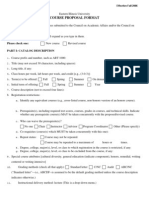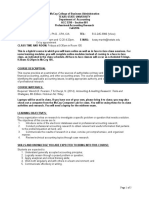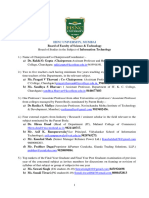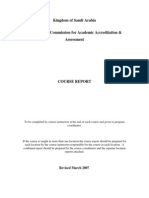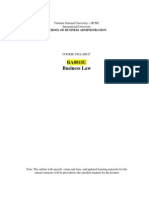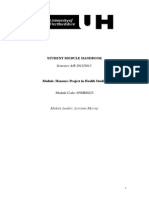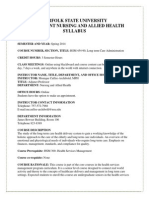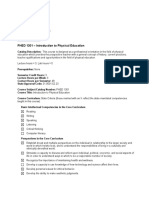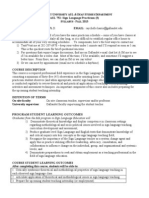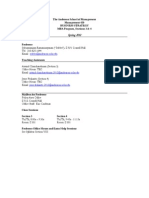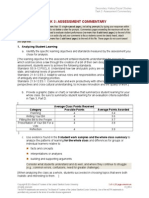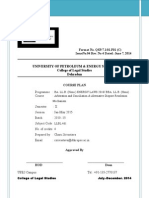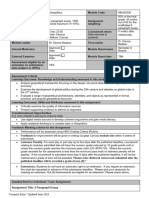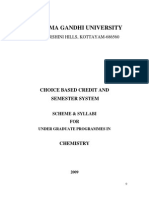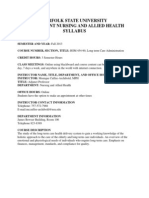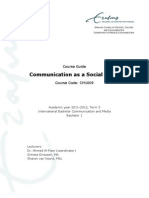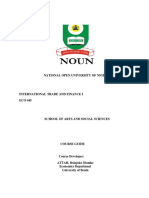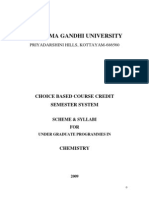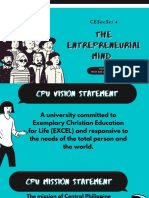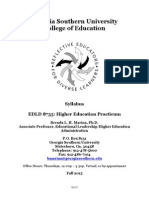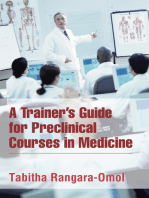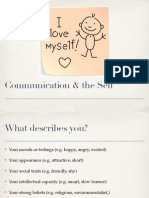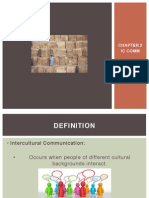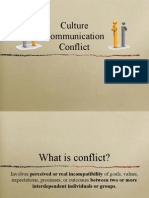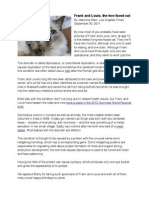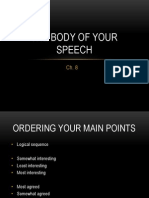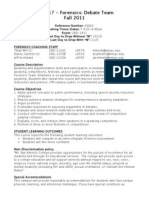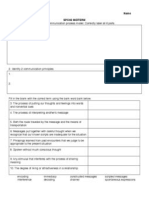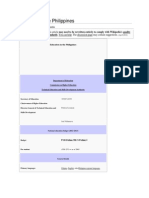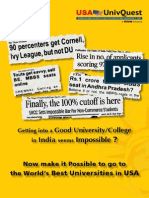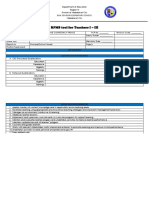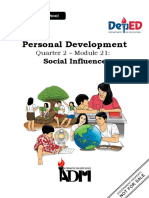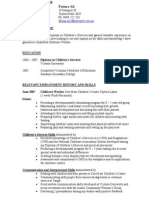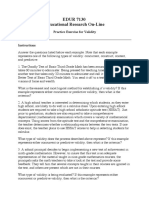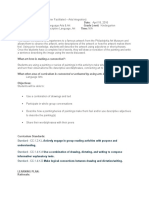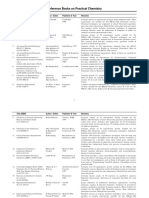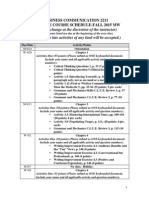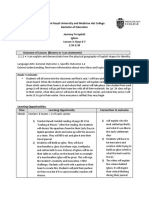SECTION A - Course Information: SPCH 17 Forensics: Debate Team Humanities and Social Sciences Division
SECTION A - Course Information: SPCH 17 Forensics: Debate Team Humanities and Social Sciences Division
Uploaded by
api-90908660Copyright:
Available Formats
SECTION A - Course Information: SPCH 17 Forensics: Debate Team Humanities and Social Sciences Division
SECTION A - Course Information: SPCH 17 Forensics: Debate Team Humanities and Social Sciences Division
Uploaded by
api-90908660Original Title
Copyright
Available Formats
Share this document
Did you find this document useful?
Is this content inappropriate?
Copyright:
Available Formats
SECTION A - Course Information: SPCH 17 Forensics: Debate Team Humanities and Social Sciences Division
SECTION A - Course Information: SPCH 17 Forensics: Debate Team Humanities and Social Sciences Division
Uploaded by
api-90908660Copyright:
Available Formats
SECTION A - Course Information
1. Course ID: 2. Course Title: 3. Division: 4. Department: 5. Subject: 6. Short Course Title: 7. Effective Term::
SPCH 17 Forensics: Debate Team Humanities and Social Sciences Division
Forensics: Debate Team Summer 2011
SECTION B - Official Course Information
1. Recommended Class Size: a. Maximum Class Size: b. Class Size Approval Date: 2. Method of Instruction:
15 10/29/08
o Lecture Laboratory o Lecture and Laboratory o Independent Studies o Distance Learning (Distance Education Delayed) for online courses.
3. Contact Hours for a Term:
o Work Experience, Occupational o Work Experience, General o Open Entry/Exit
o Distance (Hybrid Online) for online supported courses
Note: If not a variable unit/hour course, enter the hours in the "Low" column only. Leave the hours in the "High" column blank. Low High
Lecture: Lab: Activity: Clinical:
Total Hours
To To Lab/Lecture Parity?
Yes
No
167.00
To To
167.00
167 3.00
To To
4. Credit Units:
1 Unit of credit per eighteen (18) hours of lecture contact hours for a term 1 Unit of credit per fifty-four (54) hours of lab, activity or clinical contact hours for a term
5. Taxonomy of Programs (TOPS) Information: a. TOPS Code and Course Program Title:
MT SAN ANTONIO COLLEGE --FOR COMPLETE OUTLINE OF RECORD SEE MT SAC WEBCMS DATABASE-Page 1 of 5
150600 - Speech Communication
b. Course Control Number: (To be entered by the Instruction Office Only.) 6. SAM Priority Code:(Select One)
o Apprenticeship
Courses offered to apprentices only.
o Advanced Occupational
Courses taken in the advanced stages of an occupational program. Each B level course must have a C level prerequisite in the same program area.
o Clearly Occupational
Courses taken in the middle stages of an occupational program. Should provide the student with entry-level job skills.
o Possibly Occupational
Courses taken in the beginning stages of an occupational program.
o Non-Occupational
7. Please place this course into the appropriate discipline by selecting from the drop down list. The discipline placement indicates what preparation is needed to teach the course. Discipline faculty may place their courses into more than one discipline as appropriate:
8. General Course Information a. Course Credit Status: b. State Transfer Code: c. State Classification Code: d. Basic Skills Status/Level: e. Sports/Physical Education Course:
B Transferable, CSU/Private A Liberal Arts/Sciences Degrees N Not a Basic Skills Course
Yes
( Only check here if the course is a physical education course.) f. Grading Method: g. Number of repeats allowed: h. Overlap/Duplicate Course: 9. Course Preparation: Note: If this course has a new requisite, a content review supplemental form must be completed.
Letter Grade Only Activity/Other Repeatable (3 times repeatable)
Prerequisite
SPCH 15 or SPCH 20
MT SAN ANTONIO COLLEGE --FOR COMPLETE OUTLINE OF RECORD SEE MT SAC WEBCMS DATABASE-Page 2 of 5
o Corequisite o Advisory
o None
10. Course Special Designators
11. Course Program Status
Program Applicable
Stand-alone
12. Funding Agency Category:
Not Applicable o Primarily developed using economic development funds o Partially developed using economic development funds
SECTION C - Transfer Status
Baccalaureate Status is granted by the Educational Design General Education and Baccalaureate Level Subcommittee.
CSU Transferable o UC Transferable
Approval Date:
SECTION D - General Education Request
Mt. San Antonio College and CSU General Education course approval are submitted to the Educational Design GE and BL Subcommittee for approval. 1. The Articulation Officer submits the course directly to the CSU Chancellor for approval. 2. Upon receiving approval, the course is approved for the Mt. SAC Associate Degree GE and placed in the area(s) CSU approval indicate(s).
Yes
No
Approved for inclusion on Mt. SAC and CSU General Education List?
1. Mt SAC General Education Applicability:
2. CSU General Education Applicability (Requires CSU approval):
3. IGETC Applicability (Requires CSU/UC approval):
MT SAN ANTONIO COLLEGE --FOR COMPLETE OUTLINE OF RECORD SEE MT SAC WEBCMS DATABASE-Page 3 of 5
SECTION E - Course Content
1. Course Descriptions a. Catalog Description
Speaking and argumentation skills and participation in multiple inter-collegiate speaking competitions, festivals, and/or public events as members of the Mt. SAC Forensics Team. Emphasis is on parliamentary debate and limited preparation speaking. Students who repeat this course will improve skills through further instruction and practice. Off-campus public or tournament performance required.
b. Class Schedule Description:
Yes
No
Is a course description to be printed in the Class Schedule?
Participation in Mt. SAC's Forensics Team. Emphasis on limited preparation and debate. Off-campus public performance required.
2. Course Outline Information a. Lecture Topical Outline:
b. Lab Topical Outline:
- Tournament procedures and etiquette - Review safety procedures and team travel policies - Develop and practice debating skills: rebuttal, resolution, analysis - Develop and practice analytical skills for extemporaneous speaking - Develop and practice flowing skills - Practice anxiety reduction techniques - Develop and practicing current events briefings - Creating and maintain extemporaneous current events file - Prepare for competition and practice debates - Attend team retreat - Perform in three or more festivals or competitions - Review judging critiques - Serve on critical panels for speaking competition
3. Course Measurable Objectives:
1. Apply speech concepts to public performance, including speech anxiety reduction strategies. 2. Employ audience analysis strategies for extemporaneous speaking adaptation. 3. Argue positions. 4. Formulate responses to opposing arguments in debates. 5. Evaluate and select research materials to write debate outlines and texts. 6. Conduct self-evaluation through videotape review and review of competition judging critiques. 7. Evaluate, score, and critique other speakers in a speaking competition. 8. Perform in three or more festivals or competitions. 4. Course Methods of Evaluation:
Category 1. Substantial written assignments for this course include:
-At least five written debate outlines and manuscripts -Four written debate briefs of at least one-page in length -Three, two-page current event briefs If the course is degreeself-evaluation after giving an extemporaneousthis course are inappropriate because: -At least a three-page applicable, substantial written assignments in speech
MT SAN ANTONIO COLLEGE --FOR COMPLETE OUTLINE OF RECORD SEE MT SAC WEBCMS DATABASE-Page 4 of 5
Category 2. Computational or non-computational problem solving demonstrations:
Rank speakers in at least three competitions and write associated critiques of at least two pages in length
Category 3. Skills Demonstrations:
-Deliver three, ten-minute extemporaneous speeches before live audiences, both inside and outside the classroom -Participate in two fifteen-minute debates before live audiences, both inside and outside the classroom Category 4. Objective Examinations: At least one safety exam consisting of true/false, multiple choice, fill-in, and short answer prompts
5. Sample Assignments:
1. Using applicable research skills, choose a current event and select appropriate materials that you will then use to create a parliamentary debate outline for a forty-minute debate. Identify on the outline the information you will use to debate each of the following elements: value, fact, and policy. 2. Maintain an extemporaneous current events file by collecting news articles from at least three media sources (one of which can be the Internet). Group the articles by topic and for each topic, based on the analytical skills learned in the course, keep a brief record of how the information in each article could be used in an extemporaneous speech. 3. Videotape at least one eight-minute extemporaneous speech and write at least a three-page self-evaluation of how you utilized flow skills. Include in your evaluation suggestions for using flow skills more effectively in future speeches. 6. Representative Text: Book 1: Trischa Goodnow Author: Knapp and Lawrence Elements of Title: A. Galizo Parliamentary Debate Addison-Wesley Publisher: Educational 2008 Date of Publication: Publishing Edition:
MT SAN ANTONIO COLLEGE --FOR COMPLETE OUTLINE OF RECORD SEE MT SAC WEBCMS DATABASE-Page 5 of 5
You might also like
- HUGHES - Testing For Language TeachersDocument50 pagesHUGHES - Testing For Language TeachersHenriMG100% (9)
- Short Course Proposal FormatDocument11 pagesShort Course Proposal FormatMaryrose100% (3)
- Supplemental Course Outline, COMM 212 - Fall 2014 Revised Prof Wendy KellerDocument10 pagesSupplemental Course Outline, COMM 212 - Fall 2014 Revised Prof Wendy KellerboomclapslapNo ratings yet
- Novice Nook's Chess Lists - Heisman31 PDFDocument11 pagesNovice Nook's Chess Lists - Heisman31 PDFAnonymous kdqf49qbNo ratings yet
- Course Proposal FormatDocument5 pagesCourse Proposal Formatpant_gaurav5031No ratings yet
- Multiple Single Subject Professional Teaching Portfolio Guidelines9 3 13Document39 pagesMultiple Single Subject Professional Teaching Portfolio Guidelines9 3 13api-268700252No ratings yet
- Strategies, 8th Edition. Hoboken NJ: WileyDocument5 pagesStrategies, 8th Edition. Hoboken NJ: WileyAimee JiangNo ratings yet
- KIN 405. Syllabus Fall 2023-2Document13 pagesKIN 405. Syllabus Fall 2023-2Naya DulayNo ratings yet
- Syit Syllabus 2021 22Document55 pagesSyit Syllabus 2021 22Mohit LalwaniNo ratings yet
- Mechatronics 2020Document4 pagesMechatronics 2020mauissaNo ratings yet
- Kingdom of Saudi Arabia: Revised March 2007Document8 pagesKingdom of Saudi Arabia: Revised March 2007Sereen GulNo ratings yet
- Business Law Syllabus BA081IUDocument10 pagesBusiness Law Syllabus BA081IUJacky HoNo ratings yet
- MAR6157 International Marketing All Xie, JDocument9 pagesMAR6157 International Marketing All Xie, JMithilesh SinghNo ratings yet
- 6NMH0225 Handbook 2012-2013Document21 pages6NMH0225 Handbook 2012-2013shayziaNo ratings yet
- HSM 454-Syllabus-S141Document12 pagesHSM 454-Syllabus-S141api-248118605No ratings yet
- GWL3O Summative - OverviewDocument4 pagesGWL3O Summative - OverviewLillian VelauythamNo ratings yet
- Course Syllabus PHED 1301 - Introduction To Physical EducationDocument3 pagesCourse Syllabus PHED 1301 - Introduction To Physical EducationJeffNo ratings yet
- Asl752 Fall2013 SyllabusDocument12 pagesAsl752 Fall2013 Syllabusapi-243476215No ratings yet
- Examples StrategyDocument24 pagesExamples StrategyAanchal VijhNo ratings yet
- Course File BM226Document16 pagesCourse File BM226Piyush CharanNo ratings yet
- TASK 3 CommentaryDocument4 pagesTASK 3 Commentarybrileinon100% (5)
- Financial Reporting Accounting MBA SyllabusDocument4 pagesFinancial Reporting Accounting MBA SyllabusMohammed NaderNo ratings yet
- Arbitration - Course PlanDocument33 pagesArbitration - Course PlanAparna KadianNo ratings yet
- 1213MGNT4010ADocument6 pages1213MGNT4010AShailesh AtkariNo ratings yet
- Value Added CoursesDocument4 pagesValue Added CoursesJef LeNo ratings yet
- PPA 670 Fall 2009 Hybrid Syllabus2Document16 pagesPPA 670 Fall 2009 Hybrid Syllabus2Martina ZicelliNo ratings yet
- UCLA PricingDocument19 pagesUCLA Pricingee1993No ratings yet
- 5BUS2036 - Essay Assign GeopoliticsDocument3 pages5BUS2036 - Essay Assign GeopoliticsJowelle LowNo ratings yet
- Ch.E. Thermodynamics 2Document9 pagesCh.E. Thermodynamics 2Sharmaine Sta.AnaNo ratings yet
- CbcsDocument18 pagesCbcsRohithGiridharanNo ratings yet
- FINA6132FD Derivatives Markets Syllabus FD 2023-24Document7 pagesFINA6132FD Derivatives Markets Syllabus FD 2023-24Hiu Tung LamNo ratings yet
- Course Specification BIOSTATISTICSDocument11 pagesCourse Specification BIOSTATISTICSAmany El-fakhranyNo ratings yet
- 111061Document9 pages111061chamaarNo ratings yet
- Pol 107Document7 pagesPol 107madufavour56No ratings yet
- UoS Outline FINC2011 SEM2 2014 ApprovedDocument6 pagesUoS Outline FINC2011 SEM2 2014 ApprovedericaNo ratings yet
- 189 SyllabusDocument8 pages189 SyllabusAlicea LinNo ratings yet
- Chemistry Final SyllabusDocument138 pagesChemistry Final SyllabusFarhanAkramNo ratings yet
- HSM 454-Syllabus-F131Document12 pagesHSM 454-Syllabus-F131api-237186471No ratings yet
- MBA S1 MHC 0415-0715 Set 1Document4 pagesMBA S1 MHC 0415-0715 Set 1Sumit SullereNo ratings yet
- TM 1 TemplatesDocument64 pagesTM 1 TemplatesVincentnhoj L Chatto100% (2)
- PAD 739 Syllabus Update - Feb 5Document10 pagesPAD 739 Syllabus Update - Feb 5wendypg44No ratings yet
- Activity Guide and Evaluation Rubric - Unit 3 - Task 6 - Lets Discuss ItDocument7 pagesActivity Guide and Evaluation Rubric - Unit 3 - Task 6 - Lets Discuss ItCindy IbarraNo ratings yet
- Lesson Plan in PR 2Document3 pagesLesson Plan in PR 2gladen shelley billones0% (1)
- Graduate Summative Seminar 2019-2020 Course Outline WinterDocument7 pagesGraduate Summative Seminar 2019-2020 Course Outline Winterapi-497202572No ratings yet
- Assessment Commentary EdtpaDocument4 pagesAssessment Commentary Edtpaapi-252181836No ratings yet
- Lesson DesignDocument37 pagesLesson Designzamomdluli12No ratings yet
- CM1009 - Course Guide 2011-2012Document14 pagesCM1009 - Course Guide 2011-2012Elyse van ZandvoortNo ratings yet
- Uos Outline Finc3017 Sem2 2014Document5 pagesUos Outline Finc3017 Sem2 2014suseeexNo ratings yet
- Universidad Nacional Abierta Y A Distancia: Nohora Isabel SotoDocument3 pagesUniversidad Nacional Abierta Y A Distancia: Nohora Isabel SotoJairo Alberto Sanchez RodriguezNo ratings yet
- National Open University of NigeriaDocument106 pagesNational Open University of NigeriaAromasodun Omobolanle IswatNo ratings yet
- Training and DevelopmentDocument6 pagesTraining and DevelopmentSandy ChakrabortyNo ratings yet
- MBA Project Guidelines-1Document16 pagesMBA Project Guidelines-1Ashish SahuNo ratings yet
- National Commission For Academic Accreditation & Assessment: Course ReportDocument8 pagesNational Commission For Academic Accreditation & Assessment: Course ReportBhawna DhupiaNo ratings yet
- Computer Architecture Study Guide (Draft - Pending Final Review) PDFDocument93 pagesComputer Architecture Study Guide (Draft - Pending Final Review) PDFMuhammad Yaseen OsmanNo ratings yet
- CohortDocument11 pagesCohortPaul AsturbiarisNo ratings yet
- Final SyllabusDocument136 pagesFinal SyllabusLeji SirajNo ratings yet
- CESocSci 4 OrientationDocument25 pagesCESocSci 4 OrientationTrixy Fauna LuminarioNo ratings yet
- C3 2 GuidelinesDocument2 pagesC3 2 GuidelinesMikelyn AndersonNo ratings yet
- Edld 8735 Fall 2015 SyllabusDocument17 pagesEdld 8735 Fall 2015 Syllabusapi-285702156No ratings yet
- A Trainer’S Guide for Preclinical Courses in Medicine: Series I Introduction to MedicineFrom EverandA Trainer’S Guide for Preclinical Courses in Medicine: Series I Introduction to MedicineNo ratings yet
- Academic Presenting and Presentations: Teacher's BookFrom EverandAcademic Presenting and Presentations: Teacher's BookRating: 5 out of 5 stars5/5 (1)
- How to Practice Before Exams: A Comprehensive Guide to Mastering Study Techniques, Time Management, and Stress Relief for Exam SuccessFrom EverandHow to Practice Before Exams: A Comprehensive Guide to Mastering Study Techniques, Time Management, and Stress Relief for Exam SuccessNo ratings yet
- The Self f2015Document17 pagesThe Self f2015api-90908660No ratings yet
- Blocks BarriersDocument12 pagesBlocks Barriersapi-90908660No ratings yet
- Verbal IssuesDocument23 pagesVerbal Issuesapi-90908660No ratings yet
- Persuasive 1Document4 pagesPersuasive 1api-90908660No ratings yet
- ConflictDocument12 pagesConflictapi-90908660No ratings yet
- AudanaladaptDocument8 pagesAudanaladaptapi-90908660No ratings yet
- DiprosopusDocument1 pageDiprosopusapi-90908660No ratings yet
- InformativeDocument4 pagesInformativeapi-90908660No ratings yet
- Intro To CommDocument10 pagesIntro To Commapi-90908660No ratings yet
- BodyDocument10 pagesBodyapi-90908660No ratings yet
- spch17 Syll Fall2011Document4 pagesspch17 Syll Fall2011api-90908660No ratings yet
- CommbrochureDocument2 pagesCommbrochureapi-90908660No ratings yet
- ListeningDocument17 pagesListeningapi-90908660No ratings yet
- Midterm MCDocument4 pagesMidterm MCapi-909086600% (1)
- AssignmentsDocument2 pagesAssignmentsapi-90908660No ratings yet
- Course ScheduleDocument1 pageCourse Scheduleapi-90908660No ratings yet
- NvcommDocument10 pagesNvcommapi-90908660No ratings yet
- Midterm FillintheblankDocument4 pagesMidterm Fillintheblankapi-90908660No ratings yet
- Priscilla Farinas Resume PortfolioDocument2 pagesPriscilla Farinas Resume Portfolioapi-240484114No ratings yet
- Education in The PhilippinesDocument17 pagesEducation in The PhilippinesDavid Renz Pila Bonifacio100% (1)
- Usa Sat Fiitjee BrochureDocument12 pagesUsa Sat Fiitjee BrochuremicrodotcdmNo ratings yet
- LESSON PLAN IN MATHEMATICS Demo TeachngDocument3 pagesLESSON PLAN IN MATHEMATICS Demo Teachngrizza docutinNo ratings yet
- Peb 1149 Volleyball Example Syllabus: Department of Health and Human Performance Absentee PolicyDocument2 pagesPeb 1149 Volleyball Example Syllabus: Department of Health and Human Performance Absentee PolicyAnonymous MQjBLReGmXNo ratings yet
- RPMS Tool For Teacher I-IIIDocument21 pagesRPMS Tool For Teacher I-IIIMary Jane Mangune0% (1)
- Perdev Q2 Module 21Document22 pagesPerdev Q2 Module 21Jumanji100% (4)
- RPT Tahun 3 9Document15 pagesRPT Tahun 3 9wajy05No ratings yet
- Sample Resume Fatima Ali: Career ObjectiveDocument2 pagesSample Resume Fatima Ali: Career ObjectiveyurpeeNo ratings yet
- University of Sheffield - PHI103 - Self and Society - 2013 - SyllabusDocument6 pagesUniversity of Sheffield - PHI103 - Self and Society - 2013 - Syllabusna900No ratings yet
- Constructing A Performance Task Scenario Using Grape Shalisa GeeDocument2 pagesConstructing A Performance Task Scenario Using Grape Shalisa Geeapi-288254031No ratings yet
- Hippocratic OathDocument6 pagesHippocratic OathVicol GrigoreNo ratings yet
- Practice Exercise For ValidityDocument5 pagesPractice Exercise For Validitytnnt98No ratings yet
- Esicchen PDFDocument3 pagesEsicchen PDFJeshiNo ratings yet
- Self Study Report: 1 Cycle of AccreditationDocument55 pagesSelf Study Report: 1 Cycle of AccreditationlalitNo ratings yet
- A Review On The Effectiveness of Using Authentic Materials in ESP CoursesDocument13 pagesA Review On The Effectiveness of Using Authentic Materials in ESP CoursesPribadi HadhiNo ratings yet
- Lesson Plan ArtDocument4 pagesLesson Plan Artapi-314359375No ratings yet
- June Keel Announces RetirementDocument2 pagesJune Keel Announces RetirementDonMashburnNo ratings yet
- Ref BksDocument5 pagesRef Bksyotta024No ratings yet
- The Importance of Noncognitive Skills - Lessons From The GED Testing ProgramDocument6 pagesThe Importance of Noncognitive Skills - Lessons From The GED Testing ProgramThais AveiroNo ratings yet
- ENG1L Course OutlineDocument2 pagesENG1L Course OutlinedarrylhunterNo ratings yet
- Eng 2211 SyllabusDocument6 pagesEng 2211 Syllabusapi-293022027No ratings yet
- List of Files For NAACDocument2 pagesList of Files For NAACadddata100% (6)
- Moa CondevDocument5 pagesMoa CondevLester CabungcalNo ratings yet
- IglooDocument6 pagesIglooapi-278487476No ratings yet
- Admissions Closing Soon For MCH Programs in Texila American UniversityDocument3 pagesAdmissions Closing Soon For MCH Programs in Texila American UniversityfarooqeduNo ratings yet
- Text Structure AwarenessDocument6 pagesText Structure AwarenessRandy RebmanNo ratings yet
- Strategic Marketing Lectures 1Document27 pagesStrategic Marketing Lectures 1KhanMuhammadNo ratings yet




